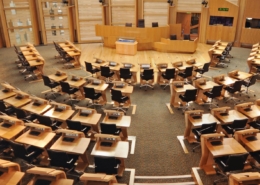The problems include the sick not being treated on time, huge queues at A&E, bed blocking, a care crisis, and recruitment – there are more than 6,000 vacancies for nurses and midwives. The system is at breaking point, though some would argue it is already broken.
This winter’s crisis seems to have snapped the patience of clinicians. Many of the public complaints and demands for action have come from within the NHS, rather than being led by opposition politicians. In recent months I’ve spoken to a wide array of health workers – smart, reform-minded consultants, GPs, nurses and senior people at trade unions – and the conversations have been uniformly gloomy. They have had enough of sticking-plaster solutions, neglect of immediate and long-term problems, and their sector being treated as a political football between the parties at Holyrood. They are worried that without fundamental change the NHS will simply fall over within a decade.
Humza Yousaf, the First Minister, was approached late last year while he was health secretary and asked to set up a “national conversation” on health reform, along the lines of the one currently taking place on education. His petitioners were rebuffed – Nicola Sturgeon’s government had too much else to worry about. Since then the system has only declined further.
I’m not sure that such an approach is the right one, anyway. The very phrase “national conversation” reeks of fudge, political control and risk avoidance. That’s the way the education review is heading, with ministers effectively having decided the parameters of what’s acceptable before the process is completed, or was even started. The last thing they want is bold ideas that will challenge their ideology and be difficult to implement.
The NHS, like schools, deserves better. The world in which it operates has changed beyond recognition since its creation in 1948. We are not so far off celebrating its centenary, but if things are allowed to continue as they are, will there be anything to celebrate? The challenges of continuing to deliver comprehensive healthcare free at the point of use are huge: the population is rapidly ageing, meaning people are living longer and therefore being sicker for longer. The number of people active in the Scottish workforce is projected to shrink, so that tax revenues are unlikely to grow with increased demand on the NHS budget. Sturgeon’s plans for a new National Care Service are such a mess that each of the three candidates to replace her promised to look at them again.










